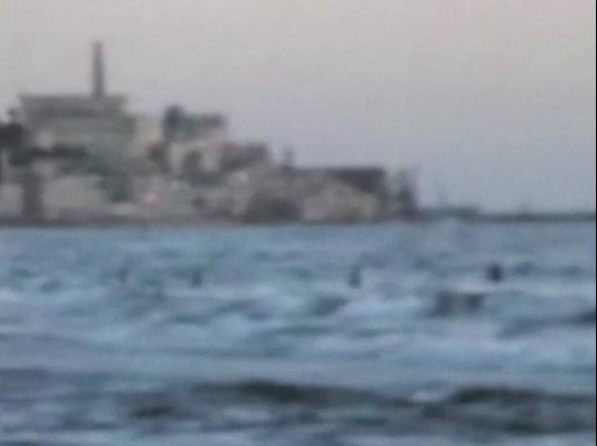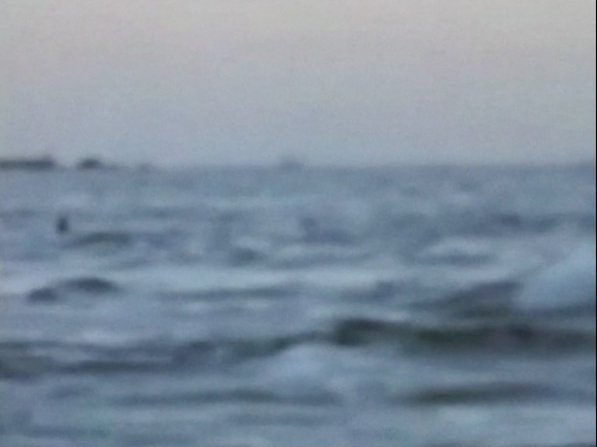October 2016
Letter
ENG––FRA
Letter for an aborted interview
November already. Your retrospective at the cinémathèque québécoise is right around the corner. This summer, in July, in a café in Beirut, you told me that you did not want to talk about your films anymore. You didn’t want to or you couldn’t? I don’t know anymore. It was this summer, in July, on the beach in Sour, that you told me that you had nothing interesting to say about them anymore. You also noted that we were a two-hour car ride away from Akka, that all we had to do is keep driving straight ahead, past the barred highway. And for a moment there it seemed so easy.
I could have made you repeat what you have been saying for many years, but there are others that did and probably better than I would have. I could have made you repeat what I myself wrote about your film, what I will be publishing in this same issue. I think it is important, in light of this retrospective, to address the difficulty of talking about your own films instead of forcing it. Is it an impossibility or saturation? Maybe an impossibility that results of saturation.
You also tell me that you do not want to talk about the past anymore. My project for an interview is aborted and I think of that hinge where the act of looking back starts to seem dishonest while that of looking ahead is still too unfocused. Ready-made sentences. A cinema of the place about the place. A cinema of the past for the future. Identity and displacement. How to stay honest amidst all of that? Especially when your cinematic gesture is that of looking back, staring at the past?
You have filmed Jaffa while living in Berlin. You have spoken about Ramlet from Locarno, New York, Rio, Venice and Los Angeles. And now you have been asked to speak about it from Montreal. There is the Palestinian filmmaker, who is also Israeli, German. An international filmmaker (as would put it Limbrick); always already exiled.
At the end of this month, in Montreal, you will be taking us to Jaffa, Ramlet and Jerusalem whereas you are already elsewhere. This summer you were in Beirut, the city where your friend in The Roof lives, the one whom you telephone, the one that gives you the sound of the waves to listen to, deformed by the bandwidth of an early 2000s cellphone. In fact, I never asked you, did you see him again in Lebanon? And the sea, did you recognize it?
2003. 2006. 2007. 2009. 2015. Maybe you should assume the temporal distance that separates your films from us today when speaking about them? Diluting, adapting, stratifying the discourse according to that gap? Because after all, each film is the result of the accumulation of the films that precede it. The Roof films the family to allow Port of Memory to linger on the place that in its turn paves the way for Recollection to rebuild a city already disappeared. With that last film, you speak to us from cinema itself, this landscape where past, present and future overlap and merge, where everything rebuilt is also instantaneously in ruin. And in the aftermath of these films, that where others will begin, you tell me that you want to keep building cities. I then ask you what’s coming next. And to that question you answer: “A sci-fi love story. Perhaps that of my grand-parents”.


FRENCH
Cher Kamal,
Novembre déjà. Ta rétrospective à la cinémathèque québécoise s’en vient. Cet été, en Juillet, dans un café à Beyrouth, tu me disais que tu ne voulais plus parler de tes films. Voulais plus ou pouvais plus ? Je ne sais plus. C’était cet été, en juillet, sur la plage à Sour. Tu me disais que tu n’avais plus rien d’intéressant à en dire. Tu notais aussi qu’on était à deux heures en voiture de Akka, qu’il suffisait juste de continuer tout droit, passé l’autoroute barrée. Et pendant un bref moment ça me semblait si facile.
J’aurais pu te faire répéter ce que tu dis déjà depuis plusieurs années, mais il y en a d’autres qui l’ont fait et peut-être mieux que moi. J’aurais pu te faire répéter ce que j’ai moi-même écrit et que je publie dans ce même dossier. Je crois qu’il est important à la lumière de cette rétrospective d’adresser la difficulté de la parole au lieu de la forcer. Est-ce une impossibilité ou une saturation ? Plutôt une impossibilité qui serait le résultat d’une saturation.
Tu me dis aussi que tu ne veux plus parler du passé. Mon projet d’entrevue tombe à l’eau et je pense à cette charnière où le geste de se retourner vers l’arrière commence à sembler malhonnête alors que celui d’aller vers l’avant est encore flou. Formules toutes faites. Cinéma du lieu sur le lieu. Cinéma du passé pour le futur. Identité et déplacement. Comment rester honnête dans tout cela ? Toi dont l’acte filmique est justement celui de regarder, de fixer le passé ?
Tu as filmé Jaffa tout en habitant à Berlin. Tu as parlé de Ramlet depuis Locarno, New York, Rio, Venise et Los Angeles. Et là on te propose d’en parler depuis Montréal. Voilà le cinéaste palestinien, qui est à la fois israélien, allemand, international (comme le dirait Limbrick) ; toujours déjà exilé.
À la fin de ce mois, à Montréal, tu vas nous amener vers Jaffa, Ramlet et Jérusalem alors que toi, tu es déjà ailleurs. Cet été tu étais à Beyrouth, cette ville dans laquelle habite ton ami dans The Roof, celui à qui tu téléphones, celui qui te laisse écouter le son des vagues déformé par la bande passante d’un téléphone portable du début des années 2000. D’ailleurs je ne t’ai pas demandé, l’as-tu revu au Liban ? Et la mer l’as-tu reconnue ?
2003. 2006. 2007. 2009. 2015. Peut-être faut-il que tu parles de tes films en assumant la distance temporelle qui te séparent d’eux aujourd’hui ? Diluant, adaptant, stratifiant le discours selon le décalage ? Parce qu’en fin de compte chaque film est le résultat de l’accumulation des films qui le précèdent. The Roof filme la famille pour permettre à Port of Memory de s’attarder sur le lieu, ce qui ouvre la porte à Recollection et à son entreprise de reconstruction d’une ville déjà disparue. Avec ce dernier film, c’est à partir du cinéma même que tu nous parles, ce paysage où passé, présent et futur se superposent et se confondent et où ce qui se reconstruit est aussi instantanément ruine. Et dans l’après de ces films, là où commencent ceux à venir, tu affirmes ton désir de continuer à construire des villes. Je te demande alors ce qui va suivre. Et à cette question tu réponds : « Une histoire d’amour en science fiction. Peut-être celle de mes grands-parents. »
à bientôt à Montréal donc,
Nour



